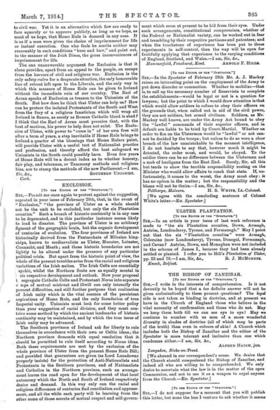[To TU. EDITOR. or THE Mac:Arca:]
Sin,—In the Spectator of February 28th Mr. A. J. Mackey raises an interesting point on the employment of the Army to put down disorder or commotion. Whether to mobilize—that is, to call up the necessary number of Reservists to complete the establishments—would be legal or not is a question for lawyers; but the point to which I would draw attention is that which would allow soldiers to refuse to obey their officers on the grounds that, when called out in aid of the civil power, they are not soldiers, but armed civilians. Soldiers, as Mr. Mackey well knows, are under the Army Act bound to obey the " lawful " commands of their superior officers, and in default are liable to be tried by Court-Martial. Whether an order to fire on the Ulstermen would be "lawful" or not can- not be decided by the troops ; but unless to do so were a clear breach of the law unmistakable to the meanest intelligence, I do not hesitate to say that, however much it might be detested, the order must, and would, be obeyed. To the soldier there can be no difference between the Ulstermen and a mob of hooligans from the East End. Surely, Sir, all this but tends to show the terrible responsibility resting on the Minister who would allow affairs to reach that state. If, un- fortunately, it comes to the worst, the Army must obey : it has no option in the matter ; but the responsibility and the blame will not be theirs.—I am, Sir, de, Pelthorpe, Mak:ern. H. S. WHITE, Lt.-Colonel. [We agree with the concluding sentence of Colonel White's letter.—ED. Spectator.]














































 Previous page
Previous page